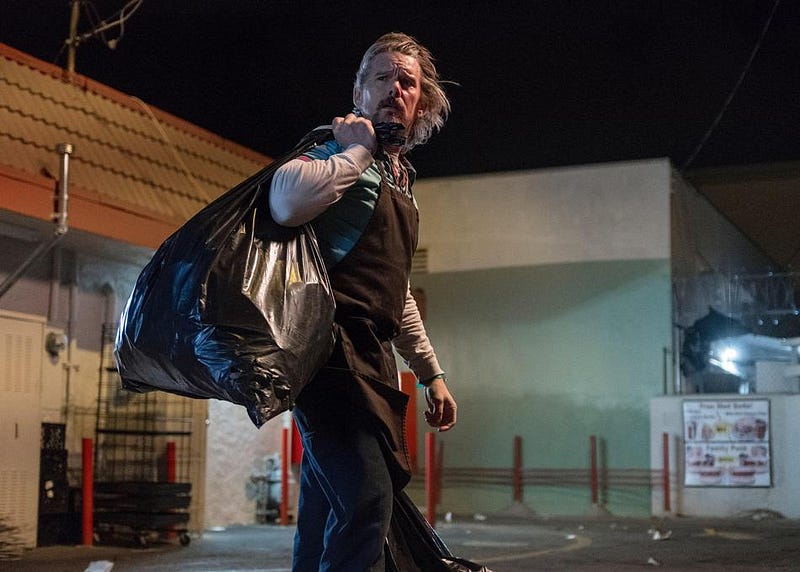Logan Marshall Green makes an auspicious directorial debut aided by the ever-impressive Ethan Hawke

Time changes. It changes people, communities, even societies. Sometimes that change comes too slowly for some people. Such is the case for Russell Earl Millings, a victim of the harsh ‘three strikes’ style system that caught up many minor offenders in the ‘90s, subjecting them to harsh penalties for cumulative minor infractions. It failed as a deterrent, and only succeeded in destroying the lives of many people you’d hesitate to call criminals. Adopt a Highway is not a film preoccupied with delving into that flawed system, but exploring the aftermath in terms of one individual. Russell Earl Millings is a man out of time, having to reintegrate to a modern world he doesn’t recognize after serving 21 years in prison for possessing an ounce of marijuana. He finds employment cleaning pots in a burger joint, a public transport ride away from his room in a crappy motel where after a long shift he eats his burger and condiment packets while watching trashy TV. And repeat. It’s a cycle his parole officer deems necessary, having to prove himself one again as if serving his time and getting out of prison wasn’t enough. Millings lives in fear of putting a step wrong and ending up back behind bars, unaware that his happening across a baby in a dumpster one evening will set in motion a series of events that breaks him out of this tragic cycle.
The rather poetic inspiration for the title is a little buried in the opening credits sequence. Paper clippings allude to the charitable work Millings undertook as a youth. He’s a decent man whose life has become defined by the little mistakes he has made, the failure to turn over this baby to the authorities being the latest. Unsurprisingly, the prospect of calling the police terrifies him; for him it’s an opportunity to foster a bond with someone, a man desperate to make a connection in this alien world. It’s a theme that persists throughout. People having paid the price with incarceration are often incorrectly prepared to return to society. In a way, it feels like a superfluous element, Hawke’s awkward return to the outside world already being of enough interest, but for the movie as a whole the baby on board segment does provide some tender and comedic moments, before revealing itself as the catalyst to push Millings onward on a slow and soulful journey as he tries to find direction and a connection.

Marshall Green is indeed blessed to have cinematic stalwart Ethan Hawke in the lead role. Even by his impressive standards, this is a remarkable turn. He instills Millings with a childish innocence juxtaposed against the features of a weathered man. Withdrawn and socially awkward, it speaks to a sadness and a lingering effect of his incarceration. So subdued and befuddled from the start, it makes his small facial inflections matter all the more impactful, from the simple joy of a day at the beach, reading to baby Ella, to the stung response on his face when an internet café employee blithely comments that “marijuana is pretty much legal now.” To Hawke’s credit that there are hints of ambiguity, you empathize and feel the dejection and frustration. Will he stay the course or “slide back”? What has twenty years in jail done to this man, and what might the fear of returning behind bars drive him to? This lack of predictability is a strong asset, and the film walks a line between comedy and tragedy well. The film gains texture from its various supporting characters such as Jorge Diaz as an internet cafe employee, Loni Love delights as a grocery store employee, or Elaine Hendrix as a gregarious road trip companion who sets in motion a cringe-worthy but rather sweet moment of courtship. Savannah and Everly Sucher are also adorable highlights as baby Ella. But this movies rests entirely on Ethan Hawke’s shoulders, and he delivers in every way.
Adopt a Highway is an auspicious directorial debut for Logan Marshall Green (Upgrade, The Invitation), who also penned the feature. Well composed, moody shots add to a soulful tone, aided by a standout score from Jason Isbell, when it’s not slathered over scenes too liberally. While it’s admirable to shine a light on such matters, an individual as well as the flawed structure of the criminal justice system in this country, there are demographics far more crippled than a young white man from a well-off family. Granted, seeing how the life of a young white man can be taken apart this way, you can only imagine how much worse it could be for a person of color. But it is a legitimate question as to whether this was the right story for this moment in time when certain demographics are being destroyed by the justice system — stories with more urgency than this. This issue is also compounded by an ending which neatly offers Millings a path to a better life. Granted, the lingering trauma and reshaping of this man’s psyche remains, but if the story was a little rougher around the edges, it might be more compelling in itself than because of the efforts of its lead. Still, the film takes an admirably indirect path to its goals, brimming with texture and empathy. Adopt a Highway is a soulful condemnation of the justice system which even at 78 minutes does seem to ramble a little, especially in the final act. It’s a film that often feels like it’s finding its way as it goes along, which is fitting seeing as that’s the journey Millings is on too.


